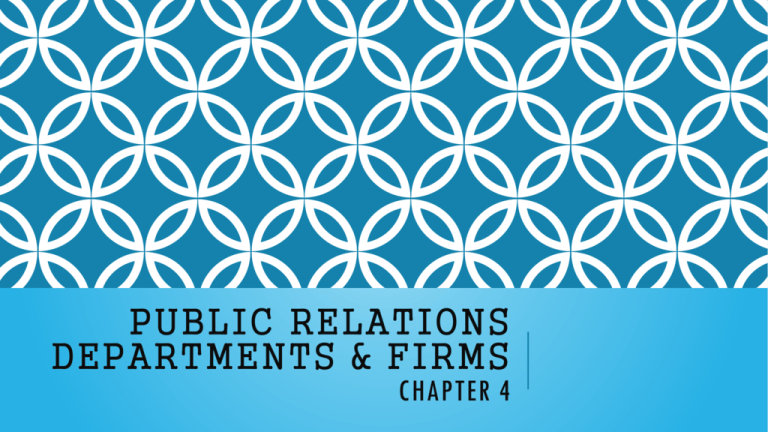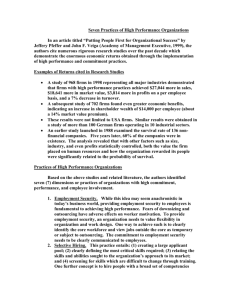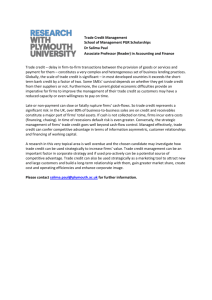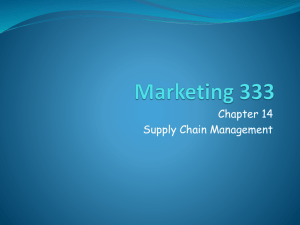File - Dr. MaryAnn Seward
advertisement

PUBLIC RELATIONS DEPARTMENTS & FIRMS CHAPTER 4 DEPARTMENTS In the beginning, the primary objectives of a public relations department were promotion and publicity. Henry Ford used a PR staff in promoting his cars in early 1900s https://www.youtube.com/watch?v=iOwUkkE2A4c Today, public relations has expanded from its traditional functions and now exercises its influence on the highest levels of management. Now, this department exists as a way of building good relationships with strategic publics. POSITION: Director of Corporate Communications at Wyndham Worldwide Corporation (international hotel and resort company) PUBLIC RELATIONS: -Media outreach for company & programs, pitching to consumer media & trades, writing & distribution of press releases, work with VP of communications on crisis communications, script writing for company executives, award notifications & submissions, work with investor Relations when appropriate on media outreach and press inquiries, tracking, media tracking & reports on monthly basis, year-end reports including key coverage by month, website tracking and conversions. MARKETING: -assist with creating & implementing campaigns, social media outreach & management of company sites, policing of branding & logo use, social media task force lead, assist with and help create and implement strategic plan ELECTRONIC COMMUNICATIONS: -oversee the company website, manage content of website & recommend enhancements, drive traffic to website JOB REQUIREMENTS 7-10 years experience in corporate media relations or PR agency Travel or hospitality experience B.A. degree in PR, communications, English, journalism, or related field Experience in developing & executing strategic media relations plans Excellent verbal and written communication skills Experience with electronic press lists and database programs Excellent computer skills Excellent interpersonal skills Ability to be a self-starter and resourceful Ability to multi-task and adapt quickly to change Experience managing crisis communications ACCESS TO MANAGEMENT The power & influence of a PR department usually result from access to top management, which uses advice & recommendations to formulate policy. This is why PR, as well as other staff functions, is located high in the organizational chart & is called on by top management to make reports & recommendations on issues affecting the entire company. LEVELS OF INFLUENCE Advisory Compulsory-Advisory Concurring Authority Advisory • Lowest level staff function • When PR is purely advisory, it is often ineffective • FOR EXAMPLE: Toyota recall; auto company generated a great deal of public, legislative, and media criticism because its public relations department was relegated to a low level and was, for all practical purposes, nonexistent in the early stages of the crisis that caused Toyota’s reputation for quality to fall off the charts. COMPULSORY-ADVISORY Organization policy requires that line managers (top management) at least listen to the appropriate staff experts before deciding on a strategy. “Although such a procedure does not limit the manager’s decisionmaking discretion, it ensures that the manager has made use of the specialized talents of the appropriate staff agency.” – Don Hellriegel & John Slocum FOR EXAMPLE: Johnson & Johnson; the Tylenol crisis, in which 7 people died after taking capsules containing cyanide, clearly demonstrated that the company based much of its reaction and quick recall of the product on the advice of its public relations staff. CONCURRING AUTHORITY This concept places public relations in the position of reviewing and approving all materials & communications with external audiences. Many firms use this mode to prevent departments & divisions from disseminating materials that do not conform to company graphic standards. FOR EXAMPLE: An operating division wishing to publish a brochure or newsletter cannot do so unless the public relations department approves the key messages and design. COOPERATION WITH OTHER STAFF FUNCTIONS The 4 areas that require cooperation to avoid possible friction and turf battles are: ◊LEGAL ◊HUMAN RESOURCES ◊ADVERTISING ◊MARKETING Public Relations Departments Public Relations Firms Most organizations have a PR department, which is often called corporate communications. Public relations firms come in all sizes, are found worldwide, and provide a variety of services Organizations, depending on their culture & management, structure the public relations function in various ways. Many large, international firms are part of a giant communication conglomerates. PR professionals often serve at the tactical level, but others are counselors to the top executive and have a major role in policy-making. In management theory, public relations is a staff function rather than a line function. The advantage of using outside firms include versatility and extensive resources. Revenues primarily come from charging a basic hourly fee, plus out-of-pocket expenses. https://www.youtube.com/watch?v= 7ptiYPcIeM8 A NUMBER OF VARIABLE ARE CONSIDERED WHEN A PUBLIC RELATIONS FIRM ESTIMATES COST OF A PROGRAM/PROJECT -size of project -duration of project -geographic locations involved - # of personnel assigned to the project -billing the use of the firm’s personnel to a client at proper hourly rates ***Standard industry practice is to bill clients 3-5 times a person’s salary! (This is due to having to pay expenses such as office space, equipment, insurance, supplies, utilities, etc.) HOW DO FIRMS MAKE THEIR MONEY??? Income is brought in from selling of staff time, but some additional income results from markups on photocopying, travel expenses, and materials provided by vendors such as graphic designs. ** *STANDARD MARKUP in the trade is between 15 & 20% !!!! FEES & CHARGES BY A PUBLIC RELATIONS FIRM Basic hourly rates, plus out-of-pocket expenses---commonly used by attorneys “Retainer fee” : service of basically being ‘on-call’ for advice & strategic counseling Fixed project fee: the firm agrees to a specific project to take on, such as the firm agreeing to do a quarterly newspaper for $30,000 annually. A set amount for a service. ***The primary basis of these is to estimate the number of hours that each project will take. DISADVANTAGES OF A FIRM Superficial grasp of a client’s unique problems- when the firm doesn’t fully understand the client’s business or needs Lack of full-time commitment- no single firm employee can monopolize its personnel and other resources Need for prolonged briefing period- Time & money may be needed to research the company to better serve the client and their company/business. Need for full information and confidence- A client must be willing to share its info, including the skeletons in the closet, with outside counsel Costs- Outside counsel is expensive. Routine Public relations work can be handled at lower cost by internal staff. ADVANTAGES OF A PUBLIC RELATIONS FIRM Objectivity- firm can analyze a client’s needs or problems from a new perspective& offer fresh insights A variety of skills and expertise- firm has specialists, whether in speech writing, trade magazine placement, investor relations, or identifying influential bloggers Extensive resources- firm has abundant media Offices throughout the country Special problem-solving skills credibility- a successful PR firm has a solid reputation for professional, ethical work A DAY IN THE LIFE OF A PUBLIC RELATIONS SPECIALIST Youtube video “A day in the life- Public Relations Specialist” https://www.youtube.com/watch?v=tUiiNghi cNM HOW DO FIRMS GET BUSINESS??? When a company/ business needs a project done but does not have the staff, time, or space to do so, they hire someone from a public relations firm to do it for them. SERVICES PROVIDED BY FIRMS Marketing Communications Executive Speech Training Research & Evaluation Crisis Communication Media Analysis Community Relations Events Management Public Affairs Branding & Corporate Reputation Financial Relations OUTSOURCING Outsourcing: Using an outside public relations counsel for services needed by their company/business The most frequent reason given for outsourcing is to bring expertise and resources to the organization that can’t be found internally. Studies have found that Fortune 500 companies now spend 25% of their public relations budgets on outside firms. In addition, almost 90% of those companies use outside public relations counsel to varying degrees. PUBLIC RELATIONS DEPARTMENT Usually is divided into specialized sections, each of which has a coordinator or manager. Common sections found in a large corporation are media relations, investor relations, consumer affairs, governmental relations, community relations, marketing communications, and employee communications. STRUCTURE OF A COUNSELING FIRM A small PR firm may consist only of the owner (President) and an assistant (vice president), who are supported by an administrative assistant. Larger firms have a more extended hierarchy. An account supervisor is in charge of 1 major account or several smaller ones. An account executive, who reports to the supervisor, is in direct contact with the client and handles most of the everyday activities. At the bottom of the list is the assistant account executive, who does routine maintenance work compiling media lists, gathering info, and writing rough drafts of news releases. ** This is typically where recent college graduates start. Once they learn the firm’s procedures and show ability, promotion to account executive may occur within 6-18 months. After 2 or 3 years, it is not uncommon for an account executive to become an account supervisor. Executives at or above the vice presidential level usually are heavily involved in selling their firm’s services. In order to prosper, a firm must continually seek new business and sell additional services to current clients. A DAY IN LIFE OF A PUBLIC RELATIONS MANAGER YOUTUBE VIDEO A DAY IN THE LIFE- PUBLIC RELATIONS MANAGER https://www.youtube.com/watch?v=BQ6hD5 MiRPc







